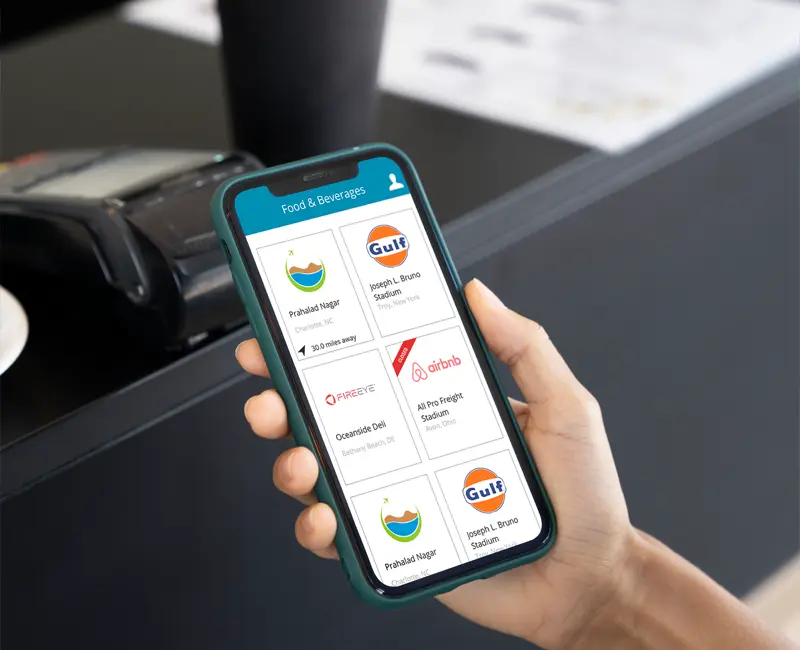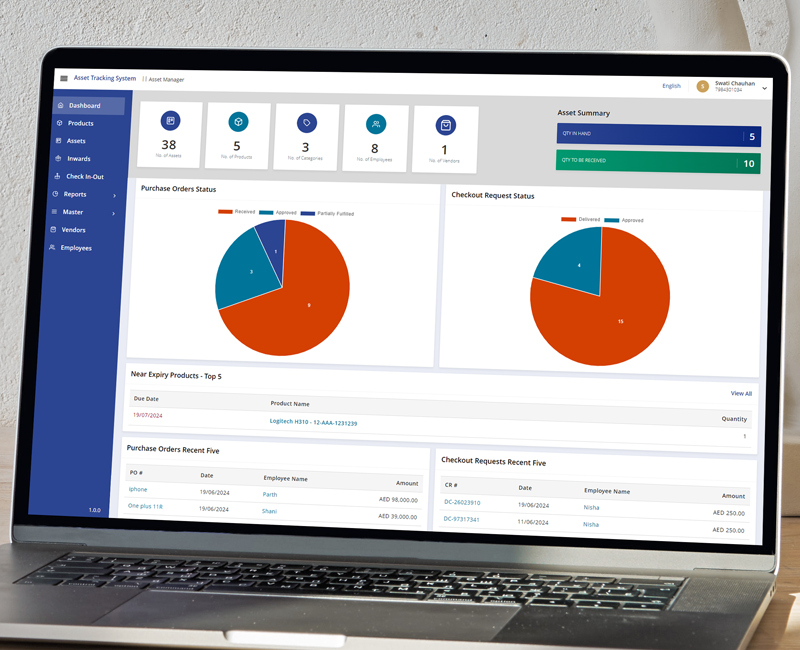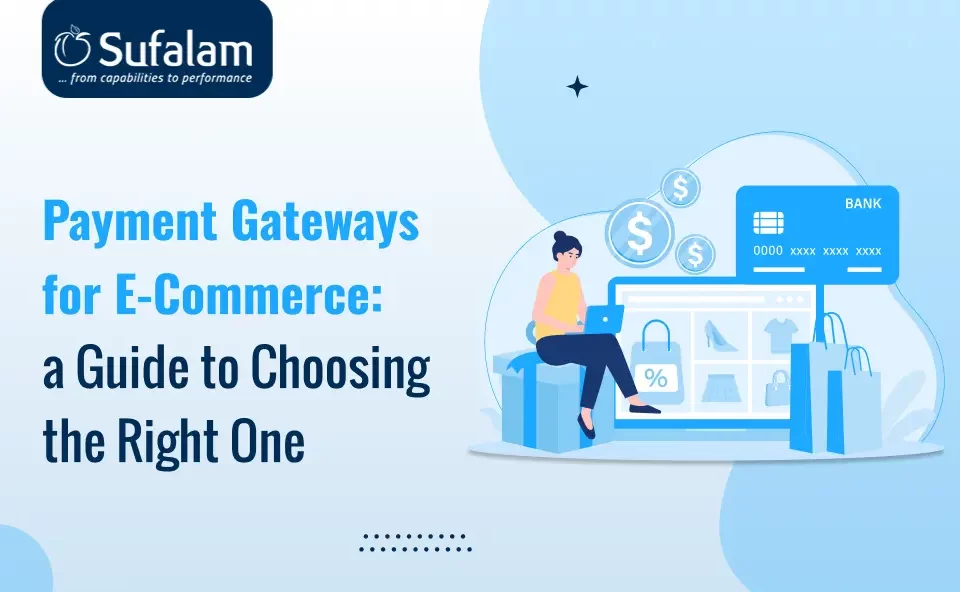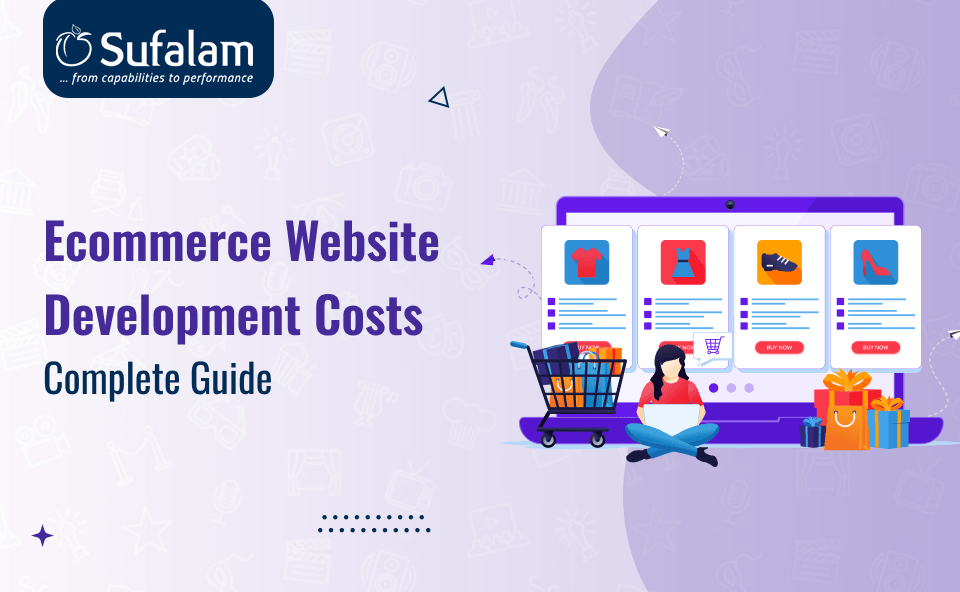Table of contents
- What is an eCommerce business?
- How to start your own eCommerce business in 2024? The Ultimate Guide You Need!
- Market, Customer & Competitor Analysis
- Determine the business structure & model
- Choose the right name & branding of your business
- Make a comprehensive business plan
- Develop an Intuitive website or online store
- Sort out your finances
- Marketing of your eCommerce store
- Determine shipping and order fulfillment plans
- Configure security and payment processing.
- To Conclude
- Frequently Asked Questions
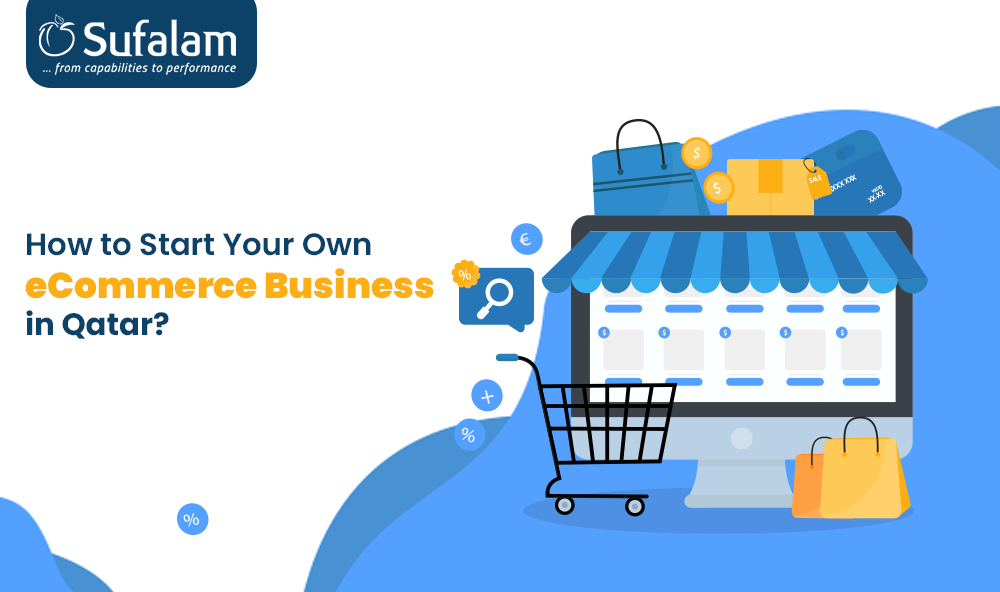
There has never been a better moment to launch an online store. eCommerce has significantly changed how organizations function today, from Fortune 500 firms to small startups.
The goal is to reach as many customers as possible by offering a seamless and convenient buying experience. And at this point, you're prepared to launch your e-commerce store in Qatar. However, where do you even begin? What is the best way to get your eCommerce firm off to a good start?
Establishing and sustaining an online store requires a significant amount of work. Fortunately, in this era of abundant digital knowledge, there are tools available to assist you in getting started. This post will walk you through the process of starting an e-commerce business in Qatar step-by-step.
Let’s dig in!
What is an eCommerce business?
E-commerce, often known as Internet commerce or electronic commerce, is the practice of purchasing and selling goods and services over the Internet.
With an eCommerce business, you can automate your processes, access a worldwide audience, and incur very little expense. The worldwide e-commerce market has experienced significant expansion during the last three years.
According to Morgan Stanley, just 15% of all retail purchases in 2019 came from online sources. By the middle of 2022, e-commerce accounted for almost 22% of total retail sales worldwide, having increased to 21% in 2021. The worldwide e-commerce market is projected to grow from its 2022 valuation of $3.3 trillion to $5.4 trillion by 2026.
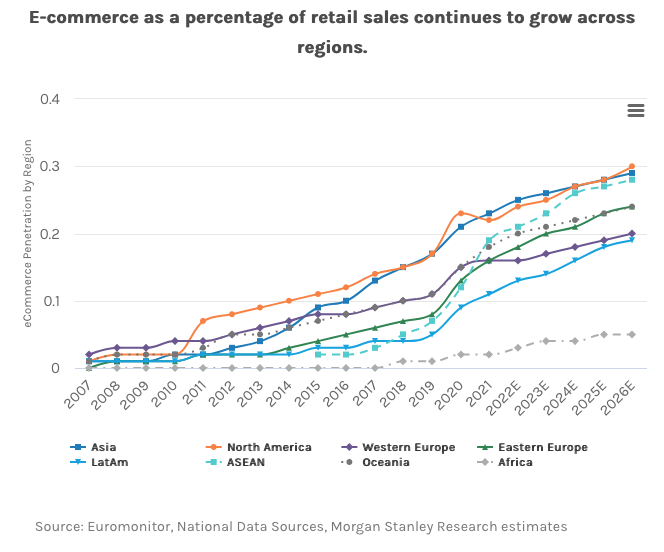
Today, almost any established business can profit from an e-commerce storefront option. To know more about starting an eCommerce business, keep reading!
How to start your own eCommerce business in 2024? The Ultimate Guide You Need!
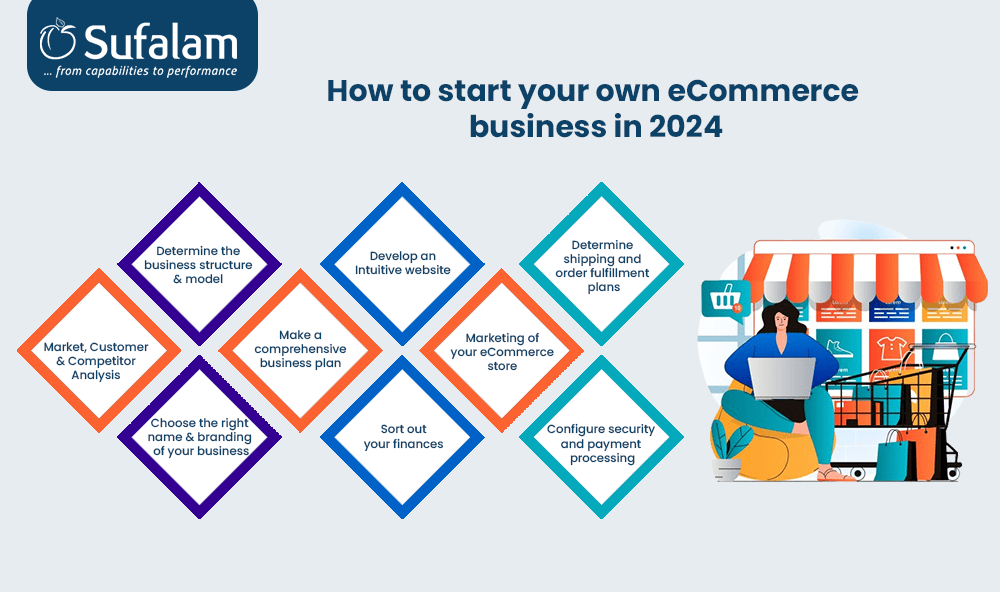
Market, Customer & Competitor Analysis
Maybe you have a general notion of what you want to sell when starting your e-commerce business. However, to move forward with eCommerce development services, you should research the competitors, ascertain the needs of your target market, and learn how to differentiate yourself from the competition with the use of market research.
Here are some ways to get crucial insights about the market, customers, and competitors in this competitive industry:
- Organizing focus groups with your target market and polling them on their needs and desires.
- Conducting an online search for your competitors, reviewing their marketing tactics, and delving into the information and resources they publish online are all good ways to start an eCommerce business.
- Examining market reports to find trends, patterns, and opportunities for improvement.
- If you lack the funds to carry out your research, check for reports, trends, and data from previous studies on the market.
Determine the business structure & model
To start your eCommerce business in Qatar, you must first lay the groundwork by adopting the appropriate legal structure and business model as well. It is an important first step in eCommerce development services because your overall business structure and model will specify your tax status, liabilities, and other details.
The most prevalent business structures are single proprietorship, partnership, limited liability company (LLC), and corporation. If you are unsure whether one is best for you, you can seek the advice of a professional.
Following the legal structure, you must select a business model. Check out the three popular ones:
- Direct-to-consumer (D2C): Brands that eliminate intermediaries like wholesalers, resellers, and retailers are referred to as using a D2C eCommerce model. It indicates that you run an internet store and offer your goods straight to consumers.
- Business to consumer (B2C): B2C companies offer goods directly to customers, much like D2C companies do. They sell other products inside their store, though, and run their business similarly to a regular retailer.
- Business to business (B2B): As the name implies, a B2B model is the direct sale of goods to another company.
Choose the right business structure and model to get started with your eCommerce store.

Choose the right name & branding of your business
Your eCommerce app then requires a name and a brand identity. The brand is extremely important to the success of your business if you're just starting an eCommerce store.
Selecting a name for your company might be exciting, but it also calls for some strategic thought. In addition to a unique yet simple name that effectively conveys what your product is, you'll want to see if the web domain, social networking handles, and legal name are accessible.
If you want to expand internationally, specifically, make sure it communicates well across cultural boundaries.
Designing a logo and other required marketing materials is essential to developing your brand. The branding of your eCommerce business should revolve around your business, your offering, identity, target market, location, etc to yield the desired results and stand out in this competitive marketplace.
Make a comprehensive business plan
After you've laid the groundwork for your company, you're ready to create a business plan. This written document outlines your goals and the financial, operational, and marketing road plan. It can help you organize and serve as a draw for possible investors.
Conduct a thorough analysis to determine the present rivals and the market environment for your offering. Establish your target market and the possible ways you might reach out to potential clients. Plan the logistics for the future months, including when, where, and how you will proceed.
Overall, make sure to include every information and get your eCommerce site up and running.
Develop an Intuitive website or online store
Your storefront will be your e-commerce website. It's where clients will browse your merchandise, make purchases, and discover more about you and your company.
Using an online store builder is the simplest approach for your eCommerce app development. These tools may help you with every step of starting an eCommerce business, including selecting a domain name, keeping track of your stock, and accepting credit card payments. BigCommerce, Squarespace, Shopify, and Square Online are a few well-known e-commerce website builders.
If you have a small business or are just getting started with online sales, a free e-commerce website builder may be a fantastic place to start an eCommerce business.
However, to add an unlimited number of items and gain access to more comprehensive tool suites, you'll often need to upgrade to a premium one. And, for a high-end eCommerce website, you need to partner with a leading mobile app development company, that can assist you with eCommerce store development.
Sort out your finances
You must have a thorough understanding of your finances and maintain good records of your income, expenses, taxes, and earnings to manage the economics of your eCommerce business.
- Maintain complete accounting records: Make sure you maintain accurate records of all your earnings and outlays by using spreadsheets or accounting software.
- Make a budget: Establish and adhere to a budget for your online store. You can control your spending and remain on top of your finances if you have a budget.
- Create a business bank account: By creating a business bank account, you can keep your personal and business finances apart.
- Control your cash flow: Your company's cash flow is its lifeline. Make sure you have enough money to pay your payments on time and cover your costs by keeping an eye on your cash flow.
- Utilize payment and invoicing systems: Control customer payments and monitor sales by utilizing payment and invoicing systems.
- Monitor sales tax: Make sure you're collecting and sending in the right amount of tax by keeping an eye on sales tax requirements.
Marketing of your eCommerce store
Now that you've launched your online business, you're ready to start servicing clients – as long as they can find your products.
One possible approach to small-business marketing could be omnichannel commerce, which involves listing your products on websites run by third parties, such as Amazon and Instagram. There are e-commerce website builders that can assist with this.
- Influencer marketing, in which you hire popular social media creators in your niche to promote your items and the store.
- Paid social media advertisements or social media content.
- Search engine optimization for your company's website.
- Email marketing efforts to current and potential clients.
A lot of e-commerce website builders include marketing tools that let you do things like make social media advertisements or send emails to customers who have left their carts empty.
But think about investing in marketing tools if you want to create more intricate campaigns. These tools may be used to develop email campaigns and templates, text customers, monitor the responses that specific consumers are receiving from your emails, and much more.
Determine shipping and order fulfillment plans
Before starting your eCommerce business, you must determine whether to manage order fulfillment and delivery in-house or by hiring a third party.
Both have advantages and disadvantages. In-house Packing, shipping, and delivering items to clients will necessitate additional labor and resources. However, you'll be able to control the caliber of your fulfillment and purchasing process and provide customized client service.
By contracting out your order fulfillment and delivery, you can avoid hiring employees or a fleet of cars to transport items. However, you'll also have less control over the standard of shipping and handling and lose oversight of the delivery procedure.
Before choosing, look into outsourcing options to make sure they meet your fulfillment criteria.
Configure security and payment processing.
As different consumers will have different preferred payment methods, it is best to offer a selection of options at the point of sale. Through payment gateways, your clients can make card payments without entering their card information. Worldpay, Stripe, and PayPal are a few examples. Be sure that the payment gateway you select is fully safe.
Investing in an SSL (secure sockets layer) certificate can improve the security of your e-commerce website beyond simply selecting a secure payment method.
Because of these certifications, users may be assured that they are visiting a secure website by seeing the small padlock in the search box. To choose the best SSL certificate for your company, make sure you do your research on the various types.
To Conclude
In summary, starting an eCommerce store in 2024 can be a great idea, but it comes with both exciting possibilities and some challenges. Technology is always changing, and people are shopping online more than ever. This means there's a big chance for success if you're ready to adapt and try new things.
To do well, you'll need to focus on understanding what your customers want and using new tools to give them a great shopping experience. It might be tough sometimes, but if you keep learning and work hard to make your customers happy, your online store can grow and be successful in the years to come.
Among all the other things, developing a feature-rich eCommerce store and properly managing it is the most important. If you are looking for a leading eCommerce development company in Qatar that can assist you with eCommerce development services or maintenance, then Sufalam Technologies is all ears. Our team of skilled professionals thoroughly goes through your needs and offers the best solutions accordingly.
Frequently Asked Questions
Is the e-commerce industry profitable?
The e-commerce sector is indeed profitable. Establishing a profitable e-commerce business is a journey, not a race. The startup phase of your firm can take anywhere from 18 to 24 months. It’s imperative that you do not use your first-ear profitability as a gauge of your company’s success. Your business will take off if you are patient and consistent with it.
How much does it cost to launch an online store?
Starting an eCommerce store is typically less expensive than opening a conventional brick-and-mortar store. If social networking is your only source of revenue, you will need to invest approximately $1000 upfront.




